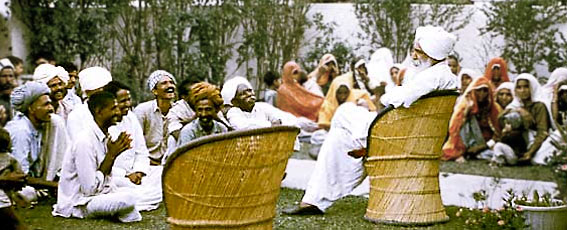By Sant Kirpal Singh, from the book "Spirituality – what it is", chapter 2
Rites and rituals as well as forms and ceremonies play an integral part in each religion. The differences in rites and rituals and in the forms and ceremonies of various religions are determined by various considerations like climatic conditions prevailing in different countries and the mode of life of the people. Let us, for instance, take the case of Arabia. It is a desert country. Owing to scarcity of water it is considered enough for an Arab to wash only his feet, hands and face before offering prayers; and where no water is available at all, he may cleanse them with sand instead, the ritual being technically known as Tayamum. Similarly, in Bikaner, another desert tract, in India, where there is dearth of water, it is commonly believed that if someone uses more than ten pounds of water in a day, he will have to account for his extravagance to God.
In the rest of India and other places where water is plentiful, no one sits for meditation without a full bath, to one's heart's content. Again, in the West, people would enter churches and attend the services bareheaded but with shoes on. In the East, it is quite the contrary. An Oriental would never enter a temple or a Gurdwara and attend the service unless he covered up his head and his feet were bare. The object in each case is, of course, the same – to maintain an attitude of respect and reverence for the holy precincts. Different modes of worship have been adopted in various parts of the world owing to climatic considerations, such as a cold climate in the West and a hot climate in the East.
All rites and rituals are correlated with the human body and are, more or less, part of social conduct. The ultimate object in each ease is to secure cleanliness and awareness on the one hand, and a respectful attitude on the other, before going into the presence of God. The outer forms that one may adopt to achieve the object are immaterial to God. He loves His creatures regardless of how and in what fashion they come to Him, just as any earthly father would love his children whether they were in rich attire or in tatters. Here is the question that naturally arises: When love is the universal religion for the entire humanity, how has mankind come to be split up into so many sectarian and watertight compartments, in spite of the fundamental unities in all religions? This segregation into groups is due to the differences in the articles of faith, which in course of time grow rigid and inelastic.
When Guru Nanak went to Mecca and preached worship of the supreme God, the Muslims declared that there was no difference between his teachings and those of Islam. Guru Nanak then explained to them that his teachings centered around "Absolute Oneness," while theirs were hedged around with limitations and were, therefore, "Relative Oneness" only. He said that God sent into the world countless prophets and Master-souls to guide the people from time to time, and will continue to do so in the future. The law of supply and demand was always at work in nature, as well as in man, and there could be no limitations to God's power to send mediators and reconcilers into the world. Similarly, from age to age and in different climes and countries, there sprang up sacred lore and scriptures like the Vedas, the Quran and the Bible, and there could be no end to these at any time.
God is infinite and man as a finite being cannot possibly know His purpose and the working of His Will, nor can he adequately sing of His limitless attributes. The more one may advance towards Him, the greater he grows in His glory and greatness – too deep for human insight to penetrate and understand Him. A fish living in the ocean cannot know the depth and extent of the ocean.
Thou art an all-knowing ocean and I, a trifling shrimp, cannot sound Thy vastness. – Sri Rag M I
God is infinite and all ideas of finitude that may be attributed to Him are, in the very nature of things, contradictions in terms – the two ideas being highly incompatible with each other. He created innumerable Brahmas, Vishnus, Shivas, Gorakhs and Naths, Ramas and Krishnas, Buddhas, Christs, and Mohammeds. All of them were the torch-bearers of His light, and many more shall come, according to the needs and requirements of the time. Man being finite cannot possibly know the infinite and His inscrutable ways whereby He fulfills His purpose. The more a person advances in mere mundane knowledge and learning, the more he recedes from Him, and the bounds of high glory fade from his view.
God is indeed limitless, but we limited beings try to limit Him in measured and restricted terms, for we cannot know Him at all until we become one with Him.
Thou art limitless; how can we as limited beings know of Thee, O Lord. – Sorath M.5

















